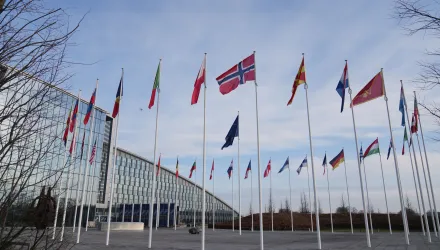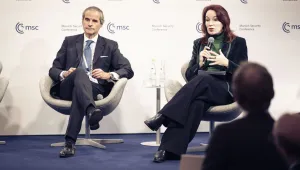President John F. Kennedy’s speech came at a critical juncture in Cold War history when tensions between the United States and the Soviet Union had reached an alarming level. Months prior to the speech, the Cuban Missile Crisis of October 1962 marked one of the most perilous moments in Cold War history. Against this backdrop, President Kennedy emphasized the imperative to focus “on a more practical, more attainable peace” through “a series of concrete actions and effective agreements which are in the interest of all concerned.” It was a call for a manageable peace that did not eradicate differences between the superpowers but recognized a common interest in averting the devastation of nuclear war.
President Kennedy called for the end of the arms race and proposed a nuclear test ban treaty. This overture sparked optimism in the Soviet Union, leading to the signing of the Partial Test Ban Treaty a few months later, which marked the beginning of a series of arms control agreements between the superpowers. The Soviet Premier, Nikita Khrushchev, was reportedly moved by Kennedy’s call for peace and his acknowledgment of the shared human condition that transcended ideological boundaries. In fact, the speech was broadcast multiple times on Soviet Radio and published in Pravda the next day. True to form, Soviet media suggested that the speech was inspired by Khrushchev’s peaceful coexistence.
The challenges that Kennedy sought to address in his speech are just as relevant today. Over the past two decades, we have witnessed a decline in regimes, treaties, and confidence-building measures which have resulted in a severe crisis in arms control. The invasion of Ukraine by Russia and the statements made by Vladimir Putin, expressing a willingness for nuclear use, have further exacerbated the precarious state of arms control. These developments have contributed significantly to the current crisis, demanding urgent attention and a renewed commitment to finding viable solutions.
The New Strategic Arms Reduction Treaty (New START), the last pillar of U.S.-Russian arms control, has been put into jeopardy. In February 2022, Russia suspended its participation, citing U.S. violations of the accord. The U.S., on the other hand, accused Russia of "ongoing violations" and ceased providing Russia with certain notifications required under the treaty. Even amidst current tensions, both continue to observe the limits on the number of nuclear warheads deployed under New START. Unfortunately, these measures alone are insufficient to address the pressing issues confronting arms control today. The situation remains dire, demanding renewed efforts to overcome the current impasse and work toward effective arms control agreements.
The relevance of Kennedy’s speech to the current U.S.-Russia arms control situation is clear: it calls for a return to diplomacy, open dialogue, and a recognition of shared interests, even in the face of seemingly insurmountable challenges. As Kennedy noted in his speech, "Our problems are man-made, therefore they can be solved by man." As we look forward, the spirit of Kennedy’s speech might serve as a beacon, inspiring a recommitment to arms control for “a more practical, more attainable peace.”
Grajewski, Nicole. “A Strategy for Peace.” June 7, 2023





